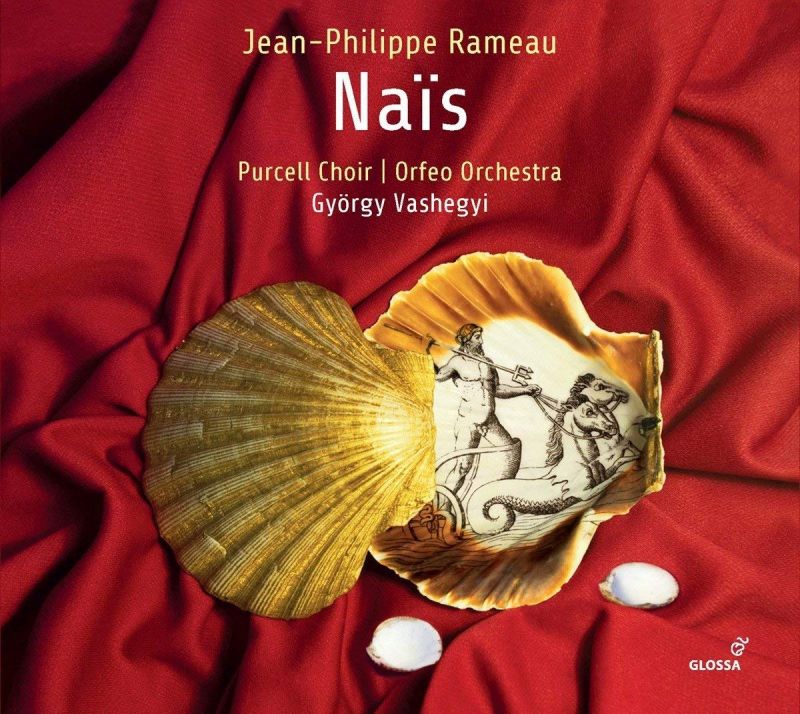RAMEAU Naïs (Vashegyi)
View record and artist detailsRecord and Artist Details
Composer or Director: Jean-Philippe Rameau
Genre:
Opera
Label: Glossa
Magazine Review Date: 08/2018
Media Format: CD or Download
Media Runtime: 145
Mastering:
DDD
Catalogue Number: GCD924003

Tracks:
| Composition | Artist Credit |
|---|---|
| Naïs |
Jean-Philippe Rameau, Composer
Chantal Santon-Jeffery, Naïs, Soprano Daniela Skorka, Flore; Shepherdess, Soprano Florian Sempey, Jupiter; Tirésie, Baritone György Vashegyi, Conductor Jean-Philippe Rameau, Composer Manuel Nuñez-Camelino, Asterion, Tenor Márton Komáromi, Protée, Tenor Orfeo Orchestra Philippe-Nicolas Martin, Palemon, Baritone Purcell Choir Reinoud van Mechelen, Neptune, Tenor Thomas Dolié, Pluton; Télénus, Baritone |
Author: Richard Lawrence
Naïs is not a tragédie en musique but a pastorale héroïque: not in five acts, therefore, but in three. In the Prologue, Titans and Giants storm the heavens. After their defeat, Jupiter – clearly to be identified with Louis XV – claims heaven and earth but delegates the ruling of the seas to Neptune and the underworld to Pluto. The opera proper opens with the nymph Naïs preparing to preside over the Isthmian Games held in honour of Neptune. The god himself appears but, wishing to be loved for himself, he is in disguise. Naïs is unaware of his identity until the very end, when – the rival suitors Astérion and Télénus having perished in battle – Neptune leads her happily down to his watery kingdom.
The original production must have been a splendid sight, the effects including fire, lightning, collapsing mountains and a sea battle. Here the effects are aural but no less splendid. The vigorous Overture, full of syncopation, trumpets and drums much in evidence, leads straight into the opening chorus. The divertissements do not stand alone but are incorporated into the action: there’s a musical link, too, between the first rigaudon and the chorus that concludes the Prologue. Indeed it’s the choruses and the dances that provide the most appealing music, and the Purcell Choir and Orfeo Orchestra under György Vashegyi do them proud. Most of the numbers are brief, but there’s a seven-minute Chaconne, moving from triple to duple time, that is marvellous in its invention and variety. The scoring throughout is delightful, highlights including a piquant combination of piccolo and bassoon in one of the minuets, and a musette (a kind of bagpipe) for the danced musettes.
The first singers of Naïs and Neptune were Marie Fel and Pierre de Jélyotte, two artists who performed in many of Rameau’s operas. Their counterparts on this recording are magnificent. Each has a slow, reflective air – Naïs’s ‘Tendres oiseaux’ and Neptune’s ‘La jeune nymphe que j’adore’ – dispatched with tenderness; but Chantal Santon Jeffery and Reinoud Van Mechelen are no less accomplished in the Italianate runs on words such as ‘éclate’ or ‘lancer’. Another haute-contre, Manuel Nuñez-Camelino is mightily impressive in the high tessitura of Astérion’s ‘Tendres bergers’. Add first-rate performances from the rest of the cast, including Florian Sempey, Thomas Dolié and Daniela Skorka taking six roles between them, and you have a winner.
Discover the world's largest classical music catalogue with Presto Music.

Gramophone Digital Club
- Digital Edition
- Digital Archive
- Reviews Database
- Full website access
From £8.75 / month
Subscribe
Gramophone Full Club
- Print Edition
- Digital Edition
- Digital Archive
- Reviews Database
- Full website access
From £11.00 / month
Subscribe
If you are a library, university or other organisation that would be interested in an institutional subscription to Gramophone please click here for further information.




